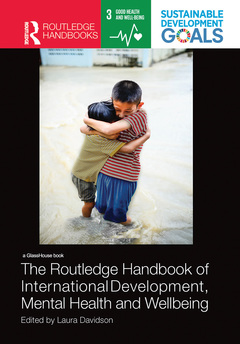The Routledge Handbook of International Development, Mental Health and Wellbeing
Coordonnateur : Davidson Laura

Mental health has always been a low priority worldwide. Yet more than 650 million people are estimated to meet diagnostic criteria for common mental disorders such as depression and anxiety, with almost three-quarters of that burden in low- and middle-income countries. Nowhere in the world does mental health enjoy parity with physical health. Notwithstanding astonishing medical advancements in treatments for physical illnesses, mental disorder continues to have a startlingly high mortality rate. However, despite its widespread neglect, there is now an emerging international imperative to improve global mental health and wellbeing. The UN?s current international development agenda finalised at the end of 2015 contains 17 Sustainable Development Goals (SDGs), including SDG3, which seeks to ensure healthy lives and promote wellbeing for all at all ages. Although much broader in focus than the previous eight Millennium Development Goals (MDGs), the need for worldwide improvement in mental health has finally been recognised. This Handbook addresses the new UN agenda in the context of mental health and sustainable development, examining its implications for national and international policy-makers, decision-makers, researchers and funding agencies. Conceptual, evidence-based and practical discussions crossing a range of disciplines are presented from the world?s leading mental health experts. Together, they explore why a commitment to investing in mental health for the fulfilment of SDG3 ought to be an absolute global priority.
Foreword, Jeffrey Sachs, The New UN Health Agenda
I: The Imperative
Chapter 1
Shekhar Saxena and Laura Davidson,
The Global Mental Health Imperative and the Role of the World Health Organization within the UN 2030 Agenda
Chapter 2,
Larry Gostin and Laura Davidson,
The Rights to Mental Health and Development
II: Economic Perspectives
Chapter 3
Martin Knapp and Valentina Iemmi,
Meeting SDG3: The Role of Economics in Mental Health Policy
Chapter 4,
Judith Bass,
The Relationship between Mental Health and Poverty in LMICs
Chapter 5,
Chris Underhill, Victoria Ngo and Tam Nguyen,
Meeting SDG1 and SDG3: Addressing the Link Between Mental Health and Economic Development in Vietnam
Chapter 6,
Sean Kidd and Kwame McKenzie,
Social entrepreneurship and systems thinking about mental illness in LMICs
III: Demographic and Cultural Perspectives
Chapter 7,
Joseph D. Calabrese,
Understanding Traditional and Other Culture-Based Approaches to Mental Illness in Lower and Middle Income Contexts
Chapter 8,
Carol Vlassoff,
Addressing Mental Health from a Gender Perspective: Challenges and Opportunities in Meeting SDG3
Chapter 9,
Svend Aage Madsen,
Men’s Mental Health and Wellbeing: The Global challenge
Chapter 10,
Guglielmo Schinina and Karoline Popp,
The Mental Health and Well-being of Migrants in the Context of the 2030 Sustainable Development Agenda
Chapter 11,
Cornelius Ani and Olayinka Omigbodun,
The Sustainable Development Goals and Child and Adolescent Mental Health in Low and Middle Income Countries
Chapter 12,
Stephen J. Bartels,
The Global Challenge of Mental Health and Ageing, and Scalable Innovations in Mental Health Services for Older Adults
IV: Policy
Chapter 13,
Rachel Jenkins,
Strengthening Government Policy to Achieve Target 3.4 of SDG3
Chapter 14,
Aart Hendriks,
Mental health, disability rights and equal access to employment: Global challenges in light of the SDGs
Chapter 15,
Dainius Pūras and Julie Hannah,
Prioritising Rights-Based Mental Health Care in the 2030 Agenda
Chapter 16,
Giuseppe Raviola,
Natural and Humanitarian Disasters, and Mental Health: Lessons from Haiti
Chapter 17,
Peter Lehmann,
Paradigm Shift: Treatment Alternatives to Psychiatric Drugs, with Particular Reference to LMICs
V: Legal Perspectives
Chapter 18,
Peter Bartlett,
Mental Disability, the European Convention on Human Rights and Fundamental Rights and Freedoms, and the Sustainable Development Goals
Chapter 19,
David Bilchitz,
The Sustainable Development Goals, Psychosocial Disability, and the Meaning of Wellbeing in SDG3: Towards an Approach that Combines the Subjective and Objective
Chapter 20,
Laura Davidson,
International Monitoring and Enforcement Mechanisms for Violations of Human Rights in the Global Mental Health Context
Chapter 21,
Laura Davidson,
The Law as Sword and Shield: Realising the Rights of those with Psychosocial Disability Through International, National and Regional Complaints Systems
VI: Country Perspectives
Chapter 22,
Salam A. Gómez,
A Case Study: Colombia, Conflict, and the Peace Process from a User-Perspective
Chapter 23,
Amita Danda,
Legislating on Mental Health in India to Achieve SDG3
Chapter 24,
Sharon Primor and Dahlia Virtzberg-Rofe
Breaking the Restraints: Civil Society’s Struggle to Abolish Human Rights Violations in Israel’s Psychiatric System
Afterword,
Vikram Patel,
Joining Up for Our Future in Global Mental Health
Index
Laura Davidson is a London Barrister at No.5 Chambers and a noted authority on human rights, mental health, disability, and capacity matters. She has both an LLM. in international law and a PhD. from the University of Cambridge, and is a regular visiting academic Fellow at the University of Cape Town, South Africa. Her academic study has included qualitative research on psychosocial disability and trauma in northern Uganda. Dr. Davidson is also an international development consultant, and in 2013 drafted Rwanda’s first mental health legislation. She provides expert advice and training to law firms, NGOs, and governments on all aspects of health care, human rights, justice, and the rule of law.
Date de parution : 03-2021
17.4x24.6 cm
Date de parution : 06-2019
17.4x24.6 cm
Thèmes de The Routledge Handbook of International Development... :
Mots-clés :
CRPD Committee; LGB Youth; global mental health; Young Men; international policymakers; Recent Intimate Partner Violence; international development; LMIC Context; human wellbeing; CRPD; LGB Child; Grand Challenges Canada; SDG8; Acquired Immune Deficiency Syndrome; Psychosocial Disabilities; SDG Target; Mental Health Treatment Gap; Mental Health Action Plan; ADHD; Attention Deficit Hyperactivity Disorder; Good Life; Mental Disability Law; Person’s Legal Capacity; National Mental Health Surveys; Mental Health Disabilities; Nice Threshold; Mental Health Promotion; Men’s Mental Health



